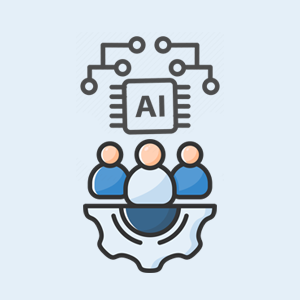 Artificial Intelligence (AI) and Machine Learning (ML) have ushered in a new era for Human Resources (HR), redefining traditional practices and fostering a more data-driven and strategic approach. In today’s rapidly evolving workplace landscape, organizations are increasingly turning to AI to address the complex challenges facing HR departments, leveraging its capabilities to streamline processes, enhance decision-making, and ultimately improve the employee experience. This article explores the myriad benefits of AI and ML in HR, showcasing how these technologies are reshaping talent management practices and propelling organizations toward greater efficiency and success.
Artificial Intelligence (AI) and Machine Learning (ML) have ushered in a new era for Human Resources (HR), redefining traditional practices and fostering a more data-driven and strategic approach. In today’s rapidly evolving workplace landscape, organizations are increasingly turning to AI to address the complex challenges facing HR departments, leveraging its capabilities to streamline processes, enhance decision-making, and ultimately improve the employee experience. This article explores the myriad benefits of AI and ML in HR, showcasing how these technologies are reshaping talent management practices and propelling organizations toward greater efficiency and success.
Benefits of AI and Machine Learning in HR:
Recruitment and Talent Acquisition:
AI-driven tools streamline the recruitment process by automating tasks like resume screening and candidate sourcing. ML algorithms analyze past hiring data to predict candidate success, enabling HR teams to make informed decisions and enhance the candidate experience.
Employee Engagement and Retention:
AI-powered analytics tools provide insights from employee data, including sentiment analysis from surveys and performance reviews. By understanding employee sentiments, HR teams can proactively address issues, personalize experiences, and improve retention rates.
Learning and Development:
AI-driven learning platforms offer personalized training experiences tailored to each employee’s needs. These platforms use ML algorithms to identify skill gaps and recommend relevant training programs, fostering continuous learning and skill development.
Performance Management:
AI-powered performance management systems facilitate continuous feedback loops between managers and employees. ML algorithms analyze performance data to identify trends and areas for improvement, enabling more objective evaluations and talent development strategies.
Workforce Planning and Optimization:
AI tools assist HR professionals in workforce planning by analyzing demographic trends and internal data. ML algorithms optimize scheduling processes, improving operational efficiency and resource allocation.
Helpful AI Tools for HR:
- Greenhouse: is an AI-powered recruiting platform that optimizes the hiring process and reduces time-to-hire by identifying top candidates and streamlining recruitment workflows.
- Culture Amp: utilizes AI-driven surveys and analytics to measure employee engagement and track changes in organizational culture, providing actionable insights to enhance employee satisfaction.
- Cornerstone OnDemand: offers AI-driven learning solutions that deliver personalized training content and recommendations, helping employees develop skills aligned with organizational goals.
- Reflektive: provides AI-powered performance management software that facilitates ongoing feedback and goal setting, enabling HR teams to recognize performance trends and identify high-potential employees.
- Visier: is an AI-driven workforce analytics platform that helps HR leaders gain actionable insights into workforce dynamics, supporting workforce planning and strategic decision-making.
Future Predictions for AI in HR:
Predictive Analytics for Employee Attrition:
AI and ML will enable HR teams to predict employee attrition more accurately by analyzing various data points such as job satisfaction, performance metrics, and external factors. This predictive capability will empower organizations to implement proactive retention strategies.
Enhanced Personalization in Learning and Development:
AI-driven learning platforms will become more sophisticated, offering hyper-personalized training experiences based on individual learning styles, preferences, and career goals. This personalized approach will maximize learning outcomes and employee engagement.
AI-Powered Employee Wellness Programs:
AI will play a pivotal role in developing proactive employee wellness programs by analyzing health data, monitoring stress levels, and providing personalized recommendations for maintaining physical and mental well-being. These programs will contribute to a healthier and more productive workforce.
Bias Detection and Mitigation:
AI algorithms will continue to evolve to detect and mitigate bias in HR processes, such as recruitment, performance evaluations, and compensation decisions. By eliminating bias, organizations can foster diversity, equity, and inclusion in the workplace.
Conclusion:
The integration of AI and Machine Learning technologies in HR holds immense promise for organizations seeking to optimize their talent management practices. As AI continues to advance, HR teams can expect to leverage predictive analytics, enhanced personalization, and innovative wellness programs to create a more engaging, inclusive, and productive workplace of the future.
